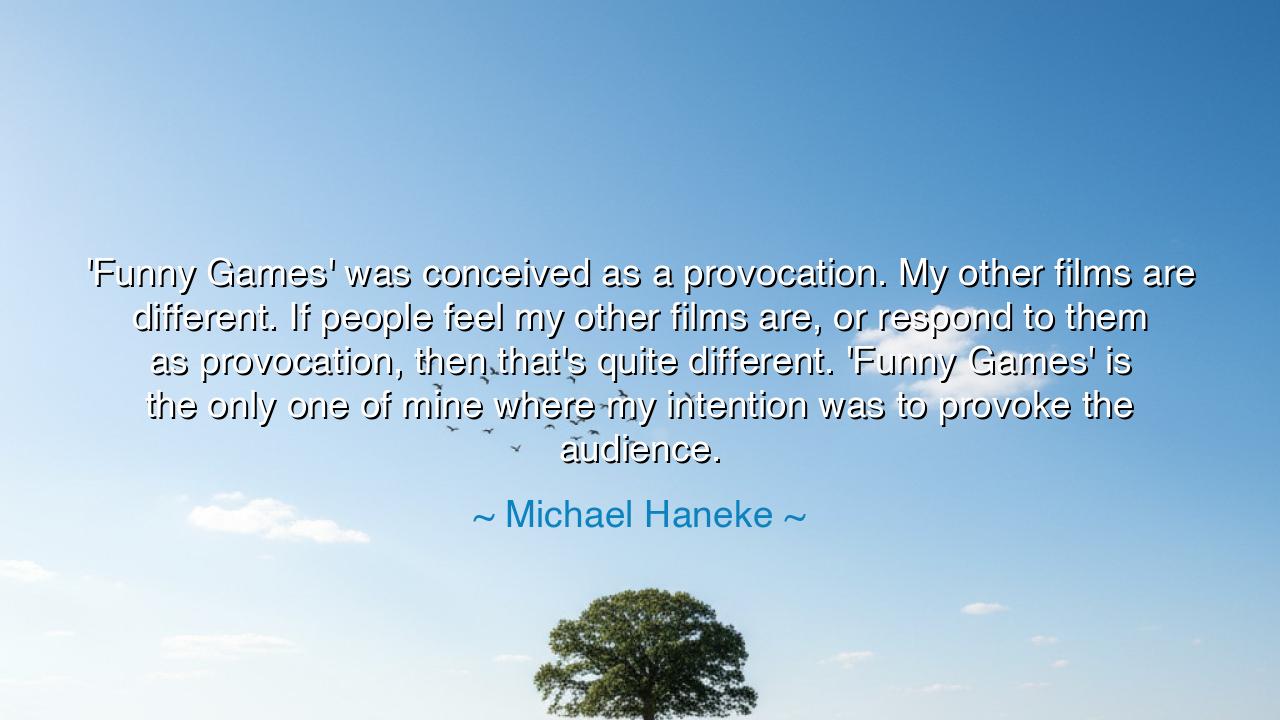
'Funny Games' was conceived as a provocation. My other films are
'Funny Games' was conceived as a provocation. My other films are different. If people feel my other films are, or respond to them as provocation, then that's quite different. 'Funny Games' is the only one of mine where my intention was to provoke the audience.






The words of Michael Haneke—“‘Funny Games’ was conceived as a provocation. My other films are different. If people feel my other films are, or respond to them as provocation, then that's quite different. 'Funny Games' is the only one of mine where my intention was to provoke the audience.”—reveal the mind of an artist who does not seek comfort, but confrontation. In this reflection lies the spirit of a creator who dares to hold a mirror before humanity—not to flatter it, but to unsettle it. Haneke, known for his unflinching portrayals of violence, alienation, and moral decay, speaks here of intention—that sacred fire that distinguishes art born of truth from art born of vanity. His words echo the calling of every artist who has chosen to disturb rather than to please, to awaken rather than to soothe.
To “provoke the audience” is not a gesture of cruelty; it is an act of moral urgency. In Funny Games, Haneke does not invite the audience to enjoy violence, but to question their appetite for it. He exposes not the brutality of the characters on screen, but the hidden brutality of the viewer’s gaze—the desire to consume suffering as entertainment. His provocation is a mirror turned outward, reflecting not the story, but the soul of the spectator. This is why his work unsettles so deeply: because it breaks the silent contract between filmmaker and audience, the unspoken agreement that the artist will comfort, not confront. In this act, Haneke becomes a philosopher of cinema, one who believes that art’s highest duty is not pleasure, but truth through discomfort.
Such a philosophy has ancient roots. The Greek dramatist Euripides was scorned in his own time for his plays that revealed the hypocrisy of Athens and the cruelty hidden in human virtue. While other playwrights glorified gods and heroes, Euripides showed the fragility of morality, the madness of vengeance, the contradictions of faith. Like Haneke, he was not content to entertain; he sought to awaken. His audiences left his plays in discomfort, but also in contemplation. It is the same sacred discomfort that Haneke brings to the modern age—a reminder that art which merely pleases perishes quickly, but art which provokes can change the soul.
When Haneke declares that Funny Games was his only work intentionally made to provoke, he acknowledges the power of deliberate moral design. The film was not created to shock for shock’s sake, but to dismantle illusion—to make the audience feel the sickness of voyeurism, the passivity of watching pain without empathy. In this, Haneke becomes both artist and moralist, using cinema as his battlefield. He exposes how society, through repetition, has turned violence into spectacle and tragedy into consumption. His weapon is not beauty, but reflection—a blade sharpened on the edge of conscience.
To provoke, in Haneke’s sense, is to awaken moral awareness through contradiction. The viewer expects resolution, but he denies it. The viewer seeks catharsis, but he withholds it. Through this, he teaches a painful truth: that reality does not always offer closure, and that empathy must be earned, not assumed. This act of provocation is not an assault—it is a summons to introspection. It asks the question few dare to face: Why do we look? Why do we enjoy? Why do we turn away? In answering these, Haneke transforms the viewer into a participant in their own moral examination.
The story of Socrates, too, is bound to this idea. The great philosopher was condemned to death not because he lied, but because he provoked. His questions shattered complacency; his truth pierced illusion. He told the Athenians that he was their gadfly, sent by the gods to sting them into awareness. Like Haneke, Socrates believed that provocation was a form of love—a hard and sacred love that demands growth. To provoke is not to destroy, but to reveal. It is an act of faith in the audience’s capacity to awaken.
From Haneke’s words, we may draw a powerful lesson for artists, thinkers, and seekers alike: do not fear discomfort—it is the birthplace of clarity. In a world that hungers for distraction, the one who provokes truth becomes a torchbearer. Let your work, your words, and your choices not merely charm, but challenge. Do not seek applause, seek understanding. For the artist who pleases dies with the moment, but the one who provokes truth lives in memory, in debate, in transformation.
So, my friends, heed this wisdom: when you create, when you speak, when you live—dare to provoke with purpose. Let your intention be pure, your conscience steady, and your art fearless. The world may resist you, but it will remember you. For as Michael Haneke shows through his Funny Games, the highest calling of art—and indeed of life—is not to lull humanity into sleep, but to awaken it to itself, no matter how painful the light may be.






AAdministratorAdministrator
Welcome, honored guests. Please leave a comment, we will respond soon